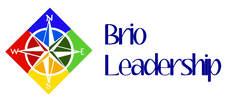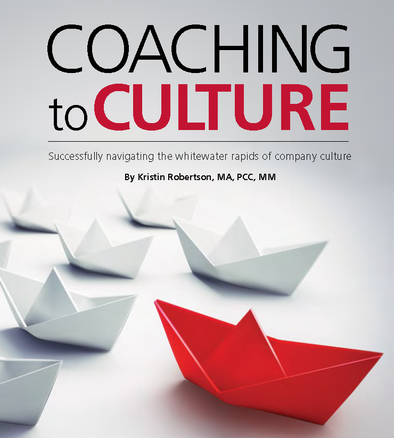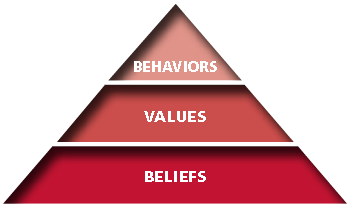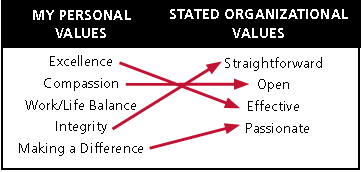|
Published in, and reproduced with permission from, choice, the magazine of professional coaching <http://www.choice-online.com> www.choice-online.com For some, navigating an organization’s culture can be like whitewater rafting – thrilling but dangerous. As I think back on all the clients I’ve coached over my career, many of them needed help understanding and fitting into their company’s culture. On the other hand, others discovered that the culture of their current position wasn’t in alignment with their personal values and decided to leave that company entirely, looking for a better fit. Our overall goal and duty as coaches is to help avoid this latter problem, enabling clients to survive and thrive in their organization’s culture. To start, let’s examine what culture really means. A company’s culture is like an individual’s personality – it influences what and how things get done. Specifically, a culture is made up of the collective underlying beliefs and worldview of the whole organization, its core values and the acceptable behaviors within the company. Culture can be thought of as a pyramid in which the beliefs, which are usually implicit, unconscious and powerful, are the foundation. Navigating culture means understanding the underlying beliefs of an organization, aligning your personal values to those of that organization and adjusting your behaviors to fit in. There are times in a client’s life where culture issues will most likely arise. Be attuned to your client when he or she experiences the following: • A new job or new promotion • A new boss or management • A company merger or acquisition • Times of market disruption • Toxic peers or boss • Life transitions • Failure to make financial goals These, among others, are the times when you, as coach, need to be highly aware of the cultural implications of your client’s situation. BELIEFS Beliefs are often unconscious and limiting, like rocks under the surface of the water. An example of an implicit organizational belief is “Only results matter, we don’t care how you get there.” An organization with that underlying belief is likely to value profitability and innovation above the means used to achieve goals. Underlying beliefs are rarely stated explicitly; rather, they are revealed in the words and actions of the leaders. They are discovered by noticing how leaders treat their employees, customers and stakeholders. Or they may be exposed in employee’s fear-based comments such as, “If I don’t make my sales numbers this quarter, I’m going to be sacked!” A wise coach or culture transformation expert will understand that negative underlying beliefs often cause the raft to overturn in whitewater – meaning the organization fails to achieve overall goals. The first duty of the coach is to name and claim the underlying beliefs for the leaders, identify how the beliefs are impeding positive change, and encourage leaders to take experimental baby-steps that challenge the beliefs. Again using the results-only belief as an example, a sales manager might be encouraged to include more than just sales numbers in their team’s evaluation, perhaps by introducing a customer satisfaction metric, in order to offset the motivation to sell at any cost. VALUES Fortunately, values are more easily discovered than beliefs. A good place to start addressing culture with your clients is to examine their own personal values. Research has shown that clarity of personal values plus clarity of organization values results in improved employee engagement. Therefore, helping your client identify and define what they wish to honor in their lives is the first step, while mapping personal values to stated organizational values is second. For example, you might suggest to your client that they complete a simple graph, like the one below, to show how their personal values line upwith the company values. This example maps a client’s values to a fictitious company’s values. Notice that one of the client’s personal values doesn’t line up with any company value. This situation presents an opportunity for the coach to further explore the significance of this mismatch with the client. • With this new information, you might ask some of these powerful questions of your client regarding their cultural values: • What values do you wish to honor in your work in this organization? • What values are in evidence in your organization? • What actions could you take to honor your personal values? • How do you reconcile your personal values to the company values/norms? • What role will you play in this culture? • How does the work you do at this organization forward your purpose in life/work? LEADERSHIP BEHAVIORS The next area to explore with your client regarding culture is their own personal leadership style. Leaders have an over-sized influence on the culture and emotional climate of their organizations. The most effective way to change a culture is to change the way leaders lead. Your client can affect cultural change by becoming more aware of the effects of her behaviors and making appropriate changes. Many coaches use a 360-degree assessment to increase self-awareness in leaders. These assessments help your client identify behaviors and beliefs that are negatively impacting their performance at work. According to Kouzes and Posner, exemplary leaders practice five important behaviors: 1. MODEL THE WAY- Set the standards for acceptable behavioral norms at one’s organization, which is a key component of company culture. 2. INSPIRE A SHARED VISION- Ensure that communication is clear about the direction and objectives of the company. 3. CHALLENGE THE PROCESS- Proactively seek better ways to operate the business. Operational processes are an often-overlooked aspect of an organizational culture. Employees are frustrated by ineffective procedures and are energized by those that streamline the work. 4. ENABLE OTHERS TO ACT- Develop team members by investing time, attention and resources in their careers. 5. ENCOURAGE THE HEART- When leaders really connect with their team members, understanding their personal situations and aspirations, they are encouraging the heart of business. Here are some powerful questions to ask of your client regarding leadership style: • To what end state or vision do you wish to inspirepeople? • What kind of example do you set with your own behavior? • Who in upper management do you see exemplifying the best of the company culture? How can you imitate her/him? • How have you interacted with your manager recently? • What is important to your manager (for example, results and/or relationships? EMOTIONAL INTELLIGENCE As noted by Daniel Goleman, leaders set the emotional tone for the rest of the organization. All eyes are constantly on the leader, seeing what type of mood he’s in in order to judge whether it’s going to be a bad or good day at the office. Leaders must be vigilant about managing their emotions to establish a positive mood for the team. Emotional intelligence is typically examined in four skill areas: self-awareness, self-management, social awareness and relationship management. The first two skills areas comprise personal competence and the last two areas comprise social competence. Many leaders who are unaware of their own emotions have trouble identifying and managing the emotions of their teams to calamitous results. Because emotional intelligence is more predictive of your overall success as a leader than is technical skill, it is very important for the coach to work with clients on their personal awareness and social intelligence. Here are some powerful questions to ask of your client regarding emotional intelligence: • What emotions were you feeling in a particular moment? • What emotions do you imagine the other person might have felt? • How could you react differently in the future? What can you do to remember to react differently? CULTURE MATTERS! The International Coach Federation (ICF) tells us that as coaches, we change the world one conversation at a time. Coaches are the midwives of culture – they deliver the leaders who have the leverage to grow a vibrant culture. Be mindful of the cultural environment as you coach, and you will multiply your impact! Published in, and reproduced with permission from, choice, the magazine of professional coaching <http://www.choice-online.com> www.choice-online.com  Kristin Robertson is the Happy Mondays Coach, whose purpose is to ensure that your employees love to go to work on Monday mornings. She is certified by Human Synergistics to conduct both the Organizational Culture Indicator and Organizational Effectiveness Indicator, which have been used by thousands of companies to transform their culture. Her breadth of experience in culture transformation, leadership development and executive coaching make her the perfect partner for a company culture turn-around.
1 Comment
|
From the desk of
|
Our services |
Our Company |





 RSS Feed
RSS Feed

